In the first five months of 2019, I have completed 10 books. That’s keeping me on my goal for 24 books this year. Four of those 10 books include fiction works and six were non-fiction. I read three books by Audible and all the others were either in physical print or on iBooks or Kindle on my iPad. As I’ve said before, when you have different formats available, you can knock down more books; and often times I don’t just read one book at a time. I have a few available depending what mood I am in. Below are short reviews of the first five books. Stay tuned for future reviews!
The Life-Changing Magic of Tidying Up by Marie Kondo
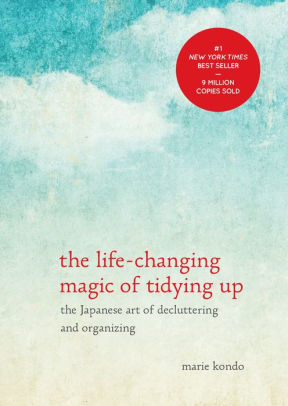
I began my year with The Life Changing Magic of Tidying Up by Marie Kondo. In 2018 I read Jordan Peterson’s 12 Rules for Life. In that book, Peterson told us we needed to clean our room, take the trash out, put our house in order. Well, Marie Kondo shows us how to do that (quite literally!)
After reading this book, I began tidying up. Marie Kondo instructs you not to tidy by location, but by category – and to start with the category of clothing. I regularly go through my clothing and make clothing donations a couple times per year, so I did not think this would amount to much. But she also introduces you to a new way of folding your clothes that both keeps your clothes in better shape and maximizes the space in your drawers and in your closet. So, six hours of all this on my first day of tidying up led to a radical transformation in my closet and in my drawers.
I discarded 142 articles of clothing in one day! Some were thrown out and others were donated. In her book she says the average person ends up discarding 160. I didn’t think I’d be anywhere near there! As most of my friends and family know, I am a very neat and clean person. But whoa, I was not this tidy until now. When deciding what to keep or discard, she asks you to pick up each item, hold it and ask: does this item spark joy? If not, you need to discard it. To prevent you from feeling bad or uncomfortable about discarding it (for whatever reason) you should thank that item for serving its purpose for you. I found when I did this, I felt more at ease in discarding it. And I was also filled with a sense of gratitude for the time I had with that item. I even discarded 280 books — most of which were taking up room in boxes in my garage. But don’t worry, there’s still plenty more around here to read and review. They are the ones that still spark joy.
One thing Marie Kondo emphasizes is that you should tidy all at once or you’ll be tidying every day. It has now been about five months since I read her book and completed an entire tidying of my home and my garage and I can tell you she is right. I no longer feel like I spend any time organizing. Of course, I clean, but cleaning is no longer a chore. Marie also tells us that everything should have a place. Every article or item you own should have a “home,” a place where it goes to rests every day. The good part about that is you then know where EVERYTHING is.
Two months after I completed my tidying up, I was looking for a souvenir concert ticket from more than 20 years ago. I found it within minutes because I knew exactly which box I had put it in. Everything has a place. I know where everything is and where everything needs to go. And I no longer have excess material things weighing me down. It feels like complete freedom. This book was short and to the point and an enjoyable read. And, on almost every page, there was practical advice I could put into action.
Elvis in The Morning by William F. Buckley, Jr.
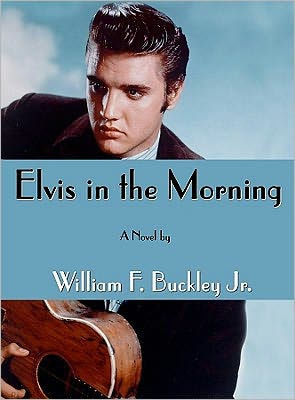
To my surprise, thanks to a recent post by Jack Fowler at National Review, I found out that William F. Buckley, Jr., the founder of National Review Institute and National Review magazine, had written a novel about Elvis Presley called Elvis in The Morning. It’s so peculiar. I have had a newfound respect for Elvis since visiting Graceland for the first time in April 2018 – so much so that I have been consuming Elvis movies, listening to more of his music, and reading even more about “The King.” And I keep seeing Elvis pop up everywhere I go. I found an Elvis statue in a restaurant in Wyoming, then one later in my own Baldwin Park neighborhood in Orlando. So, when I discovered this novel by Buckley, I had to read it.
Elvis in the Morning is a historical fiction that traces the life a young boy named Orson Killare, who grows up on a U.S. military base in Germany in the 1950s and 60s. He and his friend Priscilla start listening to Elvis’ music and form an Elvis fan club at their school. Young Orson, at age 14, is also inspired by one of his teachers to embrace socialism. Believing all property should be “common property,” young Orson decides to steal 20 copies of Elvis’ record to distribute them to young German children who can’t afford to buy his records. That’s when he’s caught and arrested. He is let go and placed on probation. The judge also tells him he is forbidden from listening to Elvis Presley’s music for the next 30 days. There’s a whole press story about it in the military papers in Germany… where Elvis Presley is stationed as a private in the US Army. Elvis learns of the story and pays a visit to young Orson – and plays live for him in his home. That’s also where Elvis meets the young Priscilla, who later becomes his wife, once she is of the marrying age.
The rest of the story details Elvis’ rise and fall and ends with the great tragedy of his death. But everything in between those bookends of the novel tells a story of the intersection of the life of Elvis and Orson – they become life-long friends and we really start to see – through Buckley’s novel – both the public and private persona of Elvis Presley, through the eyes of Orson Killare, who is both a great Elvis fan, but also a friend, and a person with his own struggles of socialist ideology, sex, drugs, and rock and roll. I feel like this may have been Buckley’s way of giving every Elvis fan a glimpse into what it would be like to be personal friends with “The King” of rock and roll, who had a very complicated American life. Of course, Orson also meets other historical figures along the way (like Barry Goldwater).
I read this book by listening to it via Audible (narrated by Lloyd James). It was very well read and I recommend the Audible version here. Since visiting Graceland, I keep saying Elvis Presley may have been the greatest American who ever lived. Buckley may have challenged that assertion a bit, by demonstrating Elvis’ faults. But we all have faults and Elvis had such a big and public life, that would have been a lot for anyone to deal with. Buckley published this novel in 2001 – about 24 years after Elvis died. That says something that someone of Buckley’s stature felt compelled to write – a novel – about the American story of Elvis Presley.
John Marshall: The Man Who Made the Supreme Court by Richard Brookhiser
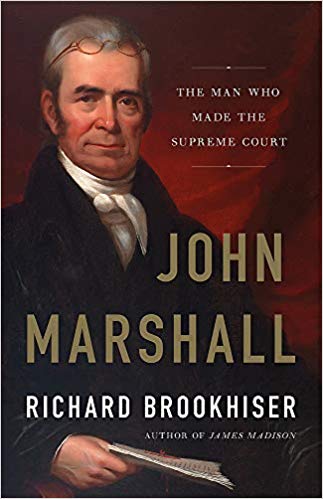
This book is a brand-new release (November 2018) by National Review Institute Fellow and eminent historian, Richard Brookhiser. It details the life of John Marshall, the third Chief Justice of the U.S. Supreme Court, but really the first Justice who brought dignity and respect to that court. He served as Chief Justice for 34 years, alongside 6 Presidents, swearing in 5 of them through 9 inaugurals.
Marshall fought in the American revolution, under General George Washington, argued for the Commonwealth of Virginia to ratify the Constitution, and then fought, as a Federalist, to defend what those men wrote in the document that continues to guide our nation, perhaps because of the legacy that Marshall brought not only to the Supreme Court, but to the country’s respect for the Constitution.
Over and over again, throughout many cases that balance federal powers and state powers, Marshall made a central claim: that the Constitution was not a compact between the states, but that it was willed – and created – by the people. Making this argument was important – because it forbid states from just being able to leave the Union because of a disagreement. It also expressly gave more rights and powers to the individual over its government. We all remember Lincoln’s pronouncement that our government was “of the people, by the people, and for the people.” But those words originated with John Marshall.
Justice Story, who served alongside Marshall in his latter years on the court, called Marshall the advocate of George Washington’s principles. Marshall wrote one book in his life, The Life of George Washington. He revered no man anymore and served to do the father of his country justice. Brookhiser says that Marshall, a Federalist, was ultimately a populist, who believed in rights, grounded in nature.
I highly recommend this book if for no other reason than the fact that the more I read about various men of the founding generation, the more I realize that when we say, “the founders believed” in this or that, we must remember that the founders had many, many disagreements among themselves, even about the Constitution, for which they were present at its birth. The founders would not speak to us today as a monolithic voice, for we are continuing the debates the founders had – debates that often end up at the Supreme Court, a place we revere perhaps because of the place of dignity Marshall made it. I have since had the privilege to hear Richard Brookhiser speak on the subject of his book and I am reminded that the best way to tell history is to tell stories that enliven our imaginations and bring the people of the past to life. Brookhiser does this in so many ways, bringing John Marshall to life for us and reminding us of the important role he played in the early days of our Republic.
1984 by George Orwell
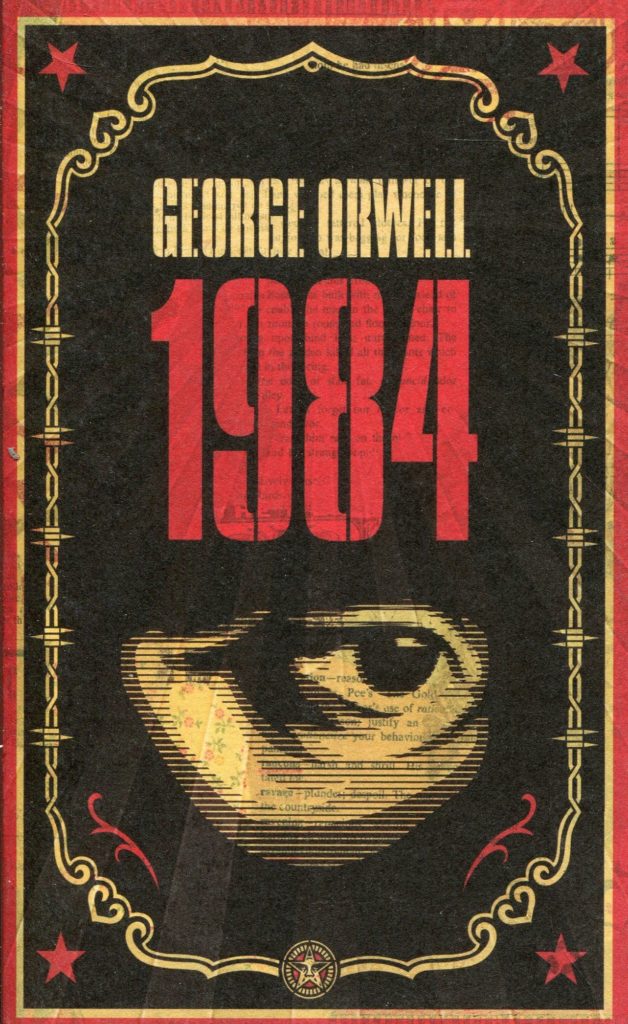
You may be wondering why it took me until 2019 to read 1984. Well, now that we are living in the days of the Amazon Echo, which may be scarier than the Telescreen in 1984, “Big Brother” certainly has all the capacities today to keep an eye, and ear, on all of us. In the days when our emails can be read, and even written for us, and when we all travel everywhere we go with little tracking devices (like our “smart” phones), 1984 seems a potential frightening reality. In Orwell’s book, we are given a new language, “Newspeak,” where old, familiar words are retained, with new definitions. “War is peace, freedom is slavery, ignorance is strength.”
But the most important thing Big Brother wants from all of us is for us to love him. As O’Brien tells Winston in Orwell’s novel, “You must love big brother; it is not enough to obey him. You must love him.” Today I look around and see a dominant culture saying you must not just accept our view, you must love our view. There is only one thing keeping us from living in a society like 1984, and Orwell alludes to it in the appendix: it is the principles of the Declaration of Independence. It is also to retain the strength of our individual heart, mind, and soul. I’m glad I finally got around to this classic book, read via Audible. I hope all read it before it is banned, changed, or adopted into Newspeak.
The Babel Tower by J.B. Simmons
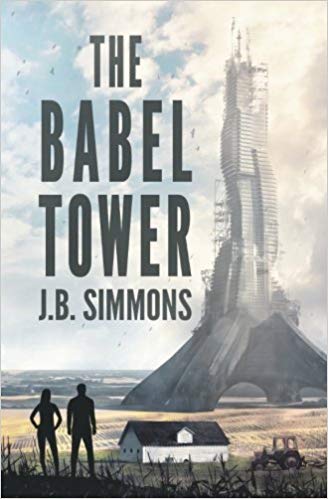
This book is a fictional work by my friend Josh Simmons, who I recently had on Episode 52 of my Agents of Innovation podcast. I asked Josh offline which book I might get started with of the 6 he has written. One he suggested was The Babel Tower. I downloaded it on my Kindle app on my iPad and was captivated immediately. If you like fantasy-style novels (Lord of the Rings, Hunger Games, Harry Potter, etc.), I really think this book has everything: a captivating story, compelling characters, and some deeper meaning behind it all. Also, I never read 335 pages so fast! I couldn’t put it down!
Quick summary of the storyline: Liz Trammel and her friends have built one of the largest companies in the world, “Babel,” which sells translation devices that are kept (almost installed) in their customer’s ears. They are always kept on so that users can easily break the language barriers of anyone they talk with. And, in order for the software to improve, the company collects and stores all the data (and by data, I mean all the conversations). The algorithm that her friend Jax created gets better after hearing all the conversations from users around the world (After just reading 1984 for the first time, this is a little scary, but totally plausible considering how Google, Facebook, and others collect and store data in our emails, etc., for some not so different purposes). Later in the story, Russian spies and Middle Eastern princes try to get access to the data, which the company always ensured would remain private, through secure servers.
The success of her company also gave Liz lots of wealth. Her father had passed some years back, but he was trying to build a very tall tower. He grew frustrated in failing at his work and had committed suicide. Now that she is the wealthiest woman in the world, she wants to do something bold with her wealth. She decides to build the largest tower in the world. Her friend Rachel warns her that she is becoming prideful – and reminds her of the Biblical story of the Tower of Babel. Liz was breaking the language barriers and now building the tallest tower in the world. Did she not see the coincidence?
Liz decides to go forward and build this tower in … western Nebraska. There are some good reasons given as to why she chose this location, but the tower encompass a city within it, including research laboratories for scientists to “conquer death” by finding new ways to expand the life span of human beings. Liz also wants to build more secured vaults for Babel’s servers, so that the data could not be accessed by anyone but her.
But as the company is buying up all the farm land around the area, one farmer, Jake Conrad, holds out. This was his family’s land for many generations and no amount of money was going to change his mind. Of course, this frustrates Liz and everyone involved in building the tower. But it also piques her curiosity about Jake and something about them sharing this land, despite their different lives and values, ties them together. The rest of the story is for you to take up on your own. I hope to add more of J.B. Simmons’ works to my future reading lists! I really enjoyed the many hours getting lost in this fantastic story. Much better than all those reruns they show every day on cable news. Jake would certainly agree.
